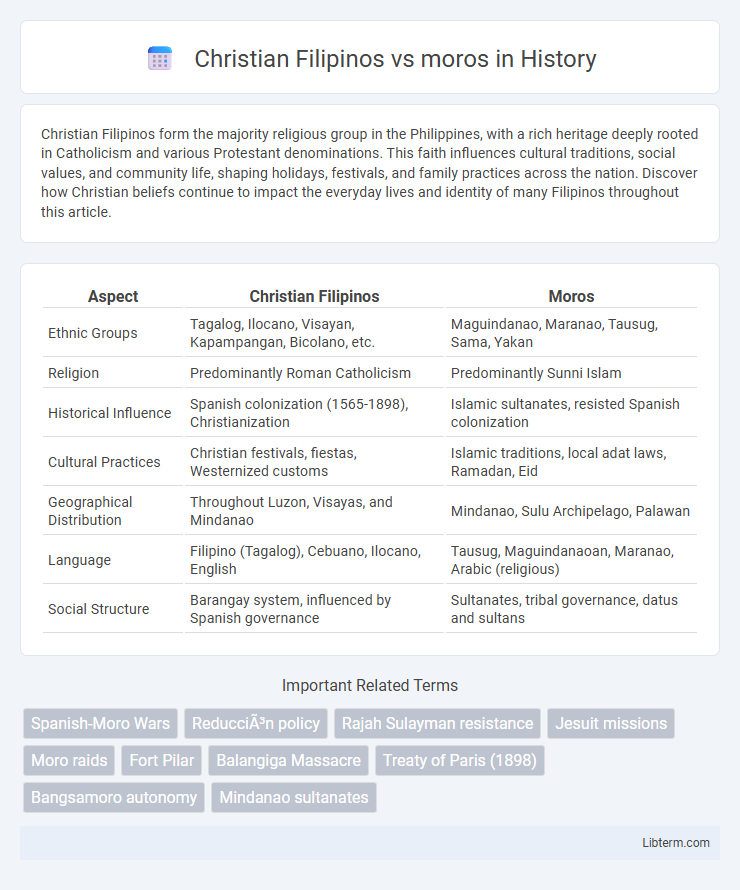Christian Filipinos form the majority religious group in the Philippines, with a rich heritage deeply rooted in Catholicism and various Protestant denominations. This faith influences cultural traditions, social values, and community life, shaping holidays, festivals, and family practices across the nation. Discover how Christian beliefs continue to impact the everyday lives and identity of many Filipinos throughout this article.
Table of Comparison
| Aspect | Christian Filipinos | Moros |
|---|---|---|
| Ethnic Groups | Tagalog, Ilocano, Visayan, Kapampangan, Bicolano, etc. | Maguindanao, Maranao, Tausug, Sama, Yakan |
| Religion | Predominantly Roman Catholicism | Predominantly Sunni Islam |
| Historical Influence | Spanish colonization (1565-1898), Christianization | Islamic sultanates, resisted Spanish colonization |
| Cultural Practices | Christian festivals, fiestas, Westernized customs | Islamic traditions, local adat laws, Ramadan, Eid |
| Geographical Distribution | Throughout Luzon, Visayas, and Mindanao | Mindanao, Sulu Archipelago, Palawan |
| Language | Filipino (Tagalog), Cebuano, Ilocano, English | Tausug, Maguindanaoan, Maranao, Arabic (religious) |
| Social Structure | Barangay system, influenced by Spanish governance | Sultanates, tribal governance, datus and sultans |
Historical Roots of Christian Filipinos and Moros
Christian Filipinos trace their roots to Spanish colonization beginning in the 16th century, which established Catholicism as a dominant religion and integrated Western cultural influences throughout Luzon, Visayas, and parts of Mindanao. Moros, primarily residing in Mindanao and Sulu, maintain a distinct identity shaped by pre-colonial Islamic sultanates and resistance to Spanish and later American colonization efforts. The historical divide between Christian Filipinos and Moros centers on religious, cultural, and political differences forged over centuries of conflict and negotiation for autonomy and territory.
Pre-Colonial Interactions and Early Religious Divides
Pre-colonial interactions between Christian Filipinos and Moro communities involved trade, alliances, and occasional conflicts shaped by cultural and religious distinctions. Early religious divides were marked by the spread of Islam in the southern Philippines and indigenous animist beliefs in Christianized northern regions. These differences laid the groundwork for later colonial and socio-political tensions influencing Filipino history.
Spanish Colonization and the Rise of Religious Identities
Spanish colonization in the Philippines entrenched Catholicism among Christian Filipinos, intensifying religious identities and creating divisions with the Muslim Moro communities. The Spanish imposed Christianization through missions and military campaigns, leading to socio-political marginalization of Moros, who resisted conversion and preserved Islamic traditions. This religious dichotomy laid the foundation for enduring cultural and territorial conflicts between Christian Filipinos and Moro groups.
Conflict and Resistance: The Moro Wars
The Moro Wars, spanning from the late 19th century to the early 20th century, marked a prolonged conflict between Christian Filipinos and the Muslim Moro communities in the southern Philippines. This resistance was fueled by Moro efforts to defend their ancestral lands and Islamic identity against Spanish and later American colonial expansion. The wars involved complex military engagements and negotiated peace efforts, highlighting deep-rooted cultural and religious divisions.
Impact of American Colonization on Christian-Moro Relations
American colonization transformed Christian-Moro relations by introducing new political structures that favored Christian Filipinos, intensifying Moro resistance and conflict. The establishment of separate administrative areas and military campaigns aimed at Moro pacification disrupted traditional power balances and escalated distrust. This period entrenched divisions, shaping ongoing socio-political tensions between Christian Filipinos and Moro communities in Mindanao.
Marginalization and Displacement of Moro Communities
Christian Filipinos' expansion and political dominance have resulted in the marginalization and displacement of Moro communities in Mindanao, where indigenous Moro populations have experienced land dispossession and cultural erasure. Government policies favoring Christian settlers and militarized efforts against Moro insurgent groups exacerbate socioeconomic inequalities and restrict Moro access to ancestral domain resources. These systemic marginalization processes undermine Moro political autonomy and contribute to ongoing conflicts and displacement crises in the southern Philippines.
Peace Efforts and Autonomy Movements in Mindanao
Peace efforts in Mindanao have centered on resolving conflicts between Christian Filipinos and Moros through comprehensive autonomy agreements like the Bangsamoro Autonomous Region in Muslim Mindanao (BARMM). The BARMM framework, established under the 2014 Comprehensive Agreement on the Bangsamoro, grants significant self-governance rights, aiming to address historical grievances and promote economic development. Continuous dialogue between government bodies, Moro Islamic Liberation Front (MILF), and Christian communities supports sustained peacebuilding and reconciliation efforts across Mindanao.
Socioeconomic Differences Between Christians and Moros
Christian Filipinos generally have higher average income levels and better access to education and healthcare compared to Moros, who predominantly reside in the Autonomous Region in Muslim Mindanao (ARMM) with limited economic infrastructure. Employment opportunities for Moros are often constrained by historical marginalization and ongoing conflicts, resulting in higher poverty rates and lower literacy levels. This socioeconomic disparity contributes to persistent gaps in social services and economic development between Christian-majority areas and Moro communities in the Philippines.
Contemporary Challenges: Prejudice, Stereotypes, and Misunderstandings
Christian Filipinos and Moros face persistent contemporary challenges rooted in deep-seated prejudice, stereotypes, and misunderstandings that fuel social division in the Philippines. Negative stereotypes portray Moros as violent or rebellious, while Christian Filipinos are often seen as dominant or exclusionary, exacerbating mistrust and discrimination. These societal biases hinder intercultural dialogue and peacebuilding, making it essential to promote mutual understanding and inclusive policies to address historical grievances and ensure equitable development.
Paths Forward: Dialogue and Reconciliation Initiatives
Dialogue and reconciliation initiatives between Christian Filipinos and Moros have centered on peace-building frameworks such as the Bangsamoro Autonomous Region in Muslim Mindanao (BARMM), which fosters political autonomy and socio-economic development. Interfaith dialogues involve community leaders and grassroots organizations to promote mutual understanding and address historical grievances. Collaborative peace programs emphasize education, cultural exchange, and joint economic projects to reduce tensions and build sustainable coexistence in Mindanao.
Christian Filipinos Infographic

 libterm.com
libterm.com